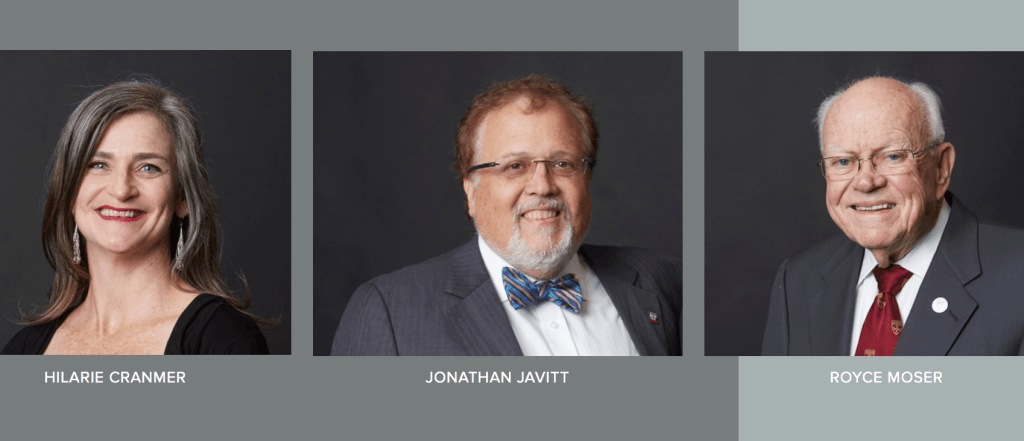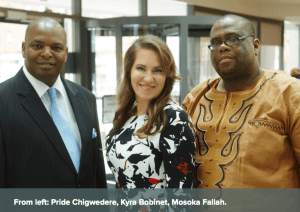
Three outstanding individuals nominated by their peers received the School’s highest alumni honor at this year’s Alumni Award of Merit Dinner held on October 3.
Hilarie Cranmer, MPH ’04
Hilarie Cranmer is an emergency physician, researcher, and educator working to advance practice standards for humanitarian responders. She has participated in the response to major humanitarian disasters, serving in the field during the 2004 tsunami in Indonesia, the 2010 earthquake in Haiti, and hurricanes Katrina and Rita in the U.S. and providing technical expertise for international medical corps during the 2014 Ebola outbreak in West Africa. As director of education and humanitarian studies at the Harvard Humanitarian Initiative, Cranmer designed an innovative training program that culminates in a simulated-disaster field experience. She also founded the Global Women’s Health Fellowship at Brigham and Women’s Hospital, is the first director of global disaster response at Massachusetts General Hospital (MGH)’s Center for Global Health, and serves as vice chair of the World Association of Disaster and Emergency Medicine. Cranmer is an assistant professor at Harvard T.H. Chan School of Public Health and Harvard Medical School and a clinical faculty member in the Department of Emergency Medicine at MGH.
Jonathan Javitt, MPH ’84
Physician and entrepreneur Jonathan Javitt has spent his career pushing the frontiers of big data to advance patient care and health outcomes. While still a resident, he helped build the first PC-based electronic medical records system. After serving as a faculty member at Johns Hopkins University, he worked for the federal government on some of the first data analysis projects using insurance claims. In 1993, he was appointed by President Bill Clinton to lead an initiative to incorporate data analytics and electronic medical records in health reform. In subsequent years, Javitt founded several health technology startups that went on to be acquired. During the George W. Bush administration, he put big data solutions to work in biodefense and drug surveillance. He founded Telcare, a company that pioneered the use of cellular devices for the monitoring and care of chronic illness. Most recently, he founded NeuroRx, a startup pharma/med-tech company that aims to introduce the first effective treatment for suicidal crisis in bipolar depression.
Royce Moser, Jr., AB ’57, MD ’61, MPH ’65
During a career spanning nearly five decades, Royce Moser served as a combat flight surgeon and helped train numerous graduate students in aerospace medicine and occupational health. Moser began his career as a physician in 1961. He served 23 years in the U.S. Air Force, with his final position as commander, USAF School of Aerospace Medicine. He then embarked on a second career in academia at the University of Utah School of Medicine.
A full professor, Moser was director of the Rocky Mountain Center for Occupational and Environmental Health. He is author of a health management text, lead author of a state medical-disaster response plan, and a contributor to aircraft accident studies that will help prevent future accidents. He served as vice president for medical affairs at the American College of Occupational Medicine and was president of the Aerospace Medical Association. An enthusiastic member of the School’s alumni community, Moser served in various leadership positions from 2003 to 2013, including as president of the Alumni Association.
Three other awards recognize achievements in public health practice, innovation, and professional service at various career stages.
 LEADERSHIP IN PUBLIC HEALTH PRACTICE
LEADERSHIP IN PUBLIC HEALTH PRACTICE
Mosoka Fallah, MPH ’12
From humble beginnings in Monrovia, Liberia, Mosoka Fallah went on to pursue humanitarian work and then graduate studies in the U.S. Months before the 2014–2015 Ebola epidemic in Liberia and two neighboring countries, Fallah returned to Monrovia to develop a public health certificate program for midlevel health workers aimed at reducing maternal and child mortality. Fallah also used the opportunity to construct a clinic catering to women and children in Monrovia’s slums. When Ebola struck, Fallah enlisted community leaders to work with him to contain its spread by tracing contacts of infected people and fostering trust. Fallah is currently a consultant with a USAID-funded project working with Liberia’s Ministry of Health and Social Welfare to develop a training program for community health officers. He also is a visiting scientist in the Department of Global Health and Population at the School and a member of the Harvard Global Health Institute and London School of Hygiene and Tropical Medicine Independent Panel on the Global Response to Ebola.
PUBLIC HEALTH INNOVATOR
Kyra Bobinet, MPH ’08
As a physician, social entrepreneur, and public health advocate, Kyra Bobinet sees the gap between what people say they want and what they actually do as the greatest barrier to improving public health in the 21st century. In 2014, she started engagedIN, a firm that uses neuroscience research to help the wellness and health care industries promote behavior change and health engagement. Previously, she had served in several roles at Aetna, where she developed technology products to help seniors live independently at home, and led clinical efficacy studies in mind-body stress reduction and metabolic syndrome. Bobinet has held leadership roles in health care and founded and directed a nonprofit organization for at-risk, detained youth. She teaches at Stanford School of Medicine and is the author of Well Designed Life: 10 Lessons in Brain Science & Design Thinking for a Mindful, Healthy, & Purposeful Life.
EMERGING PUBLIC HEALTH PROFESSIONAL
Pride Chigwedere, SD ’08
As a physician in Zimbabwe, Pride Chigwedere watched his AIDS patients die for lack of antiretroviral (ARV) drugs. At the School, Chigwedere wrote a thesis linking South African President Thabo Mbeki’s delay in launching an ARV program in that country to more than 330,000 deaths and at least 35,000 babies born with HIV infections that could have been prevented. The paper received international attention when published, and Chigwedere was hired by UNAIDS to review progress toward reaching ARV targets in 21 African countries. This work became the basis for policies at the African Union Ministers of Health Meeting and the Africa Common Position to the UN General Assembly High-Level Meeting on AIDS. He went on to become a senior adviser to the African Union. Chigwedere has also worked with McKinsey & Company as a consultant to pharmaceutical companies and global health institutions, primarily in the areas of business strategy and medical affairs.







